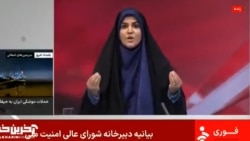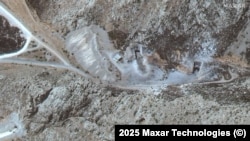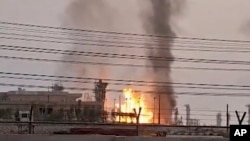Israel attacked Iranian state television IRIB as it broadcast live on June 16, temporarily knocking the station off the air following a warning to residents of Tehran to leave after threatening the capital will "pay the price" for Iranian missile strikes that hit Tel Aviv and Haifa and killed eight people.
As the station, the country's only Persian-language all news channel, was broadcasting, explosions could be heard as a female presenter was on air. The woman quickly went off camera as dust and debris crashed around the studio. It appeared she was unhurt.
Authorities provided no immediate information about casualties and damage at the broadcaster, but video showed a massive fire and plumes of black smoke rising from the building.
Hours earlier, Israel's military posted a warning specifically naming Tehran's District 3 as a target that would come under attack. The district, which has some 300,000 residents, is home to IRIB, an intelligence division headquarters, and some high-ranking leaders.
Tehran's streets have been packed with traffic heading out of the capital as residents flee after several days of air attacks that have targeted nuclear and military facilities, as well as residential buildings that Israel said house senior officials and nuclear scientists.
Some residents reported long lines at gas stations and limits on the amount of fuel customers could receive, while in the north, where many are headed, food shortages were starting to appear.
The warning were issued as the prospects of an escalation in the conflict between the two countries hang over a Group of Seven (G7) summit in Canada.
Earlier in the day, Israel's national emergency services said that 23 people have now died in Iranian attacks on Israel since June 13, when Israel launched air strikes at nuclear and military targets across Iran over the country's nuclear program. Iranian authorities say Israeli attacks have killed at least 224 people over the same time period.
Rescue workers continued to sift through rubble and debris in the northern coastal city of Haifa after Iran launched attacks in the early hours of June 16 that injured more than 100 Israelis, while in Tel Aviv, missiles hit several residential buildings, some of which were close to a US consulate.
"The residents of Tehran will pay the price, and soon," Israeli Defense Minister Israel Katz said, accusing Iran of purposely targeting residential buildings.
Iranian Foreign Ministry spokesman Ismail Baghaei called on the United Nations on June 16 to "recognize and condemn Israel's aggression" while accusing the United States of complicity in the attacks.
President Donald Trump said on June 15 that the United States is not involved in the conflict, but as the archenemies continue to launch air strikes at each other, he admitted it's "possible" that will change.
Speaking to reporters before departing for the Group of Seven (G7) summit, Trump said the US would continue to support Israel, but declined to answer what it would take for the United States to be directly involved. He continued to press Iran to negotiate on its nuclear program.
“They should talk, and they should talk immediately,” Trump said during a bilateral meeting with Canadian Prime Minister Mark Carney.
Trump added that Iran "is not winning this war” and said a deal will eventually be signed with Iran.
"As I've been saying, I think a deal will be signed, or something will happen, but a deal will be signed, and I think Iran is foolish not to sign," Trump told reporters on the sidelines of the G7 summit.
Amid fears the conflict could broaden across the Middle East, Yemen's Houthis said on June 15 that they fired missiles at Israel in coordination with Iran.
It was the first time an Iran-aligned group has publicly announced joint cooperation on attacks with Tehran.
Nuclear Talks Canceled
The outbreak of air strikes forced the cancellation of a new round of nuclear negotiations between the United States and Iran, planned for June 15 in Oman.
Iran had described the talks as "meaningless" after the Israeli air strikes, and Foreign Minister Abbas Araqchi told state media that continuing the negotiations would be unjustifiable.
However on June 16, Iranian state media reported that Araqchi has told three of his European counterparts that Iran is serious about diplomacy and never left negotiating table but must now focus on confronting “aggression.”
Baghaei said that even though Iran's nuclear program is for civilian purposes only -- a claim Tehran has made for years -- the Israeli attacks are "a fatal blow to the nuclear nonproliferation system and international law," and that is why Europe's silence on the matter is "a blow to the nuclear nonproliferation system.
Iranian lawmakers have said they will introduce a motion in the coming days to withdraw from the Treaty On The Non-Proliferation Of Nuclear Weapons (NPT).
In the initial waves of attacks, Israel had appeared to avoid striking Iran's energy infrastructure amid rising world fuel prices, but Iran's Oil Ministry said early on June 15 that Israeli strikes had hit two fuel depots in Tehran.
Earlier, Iranian state media said fire broke out at the South Pars gas field in the southern Bushehr Province during an Israeli attack.













